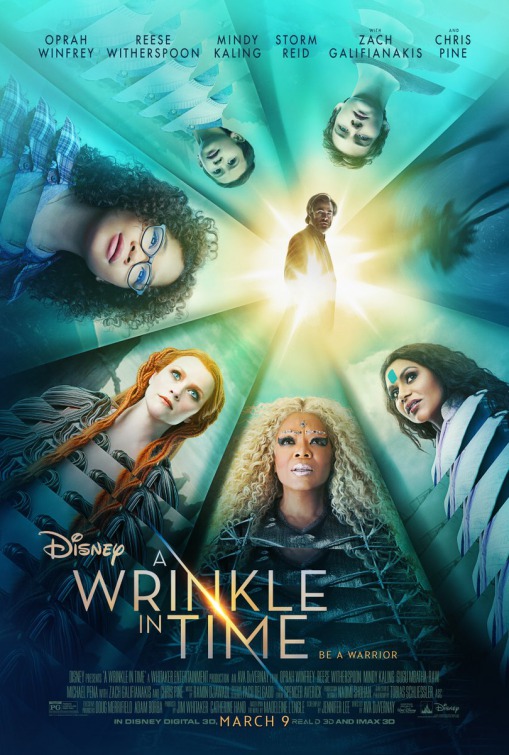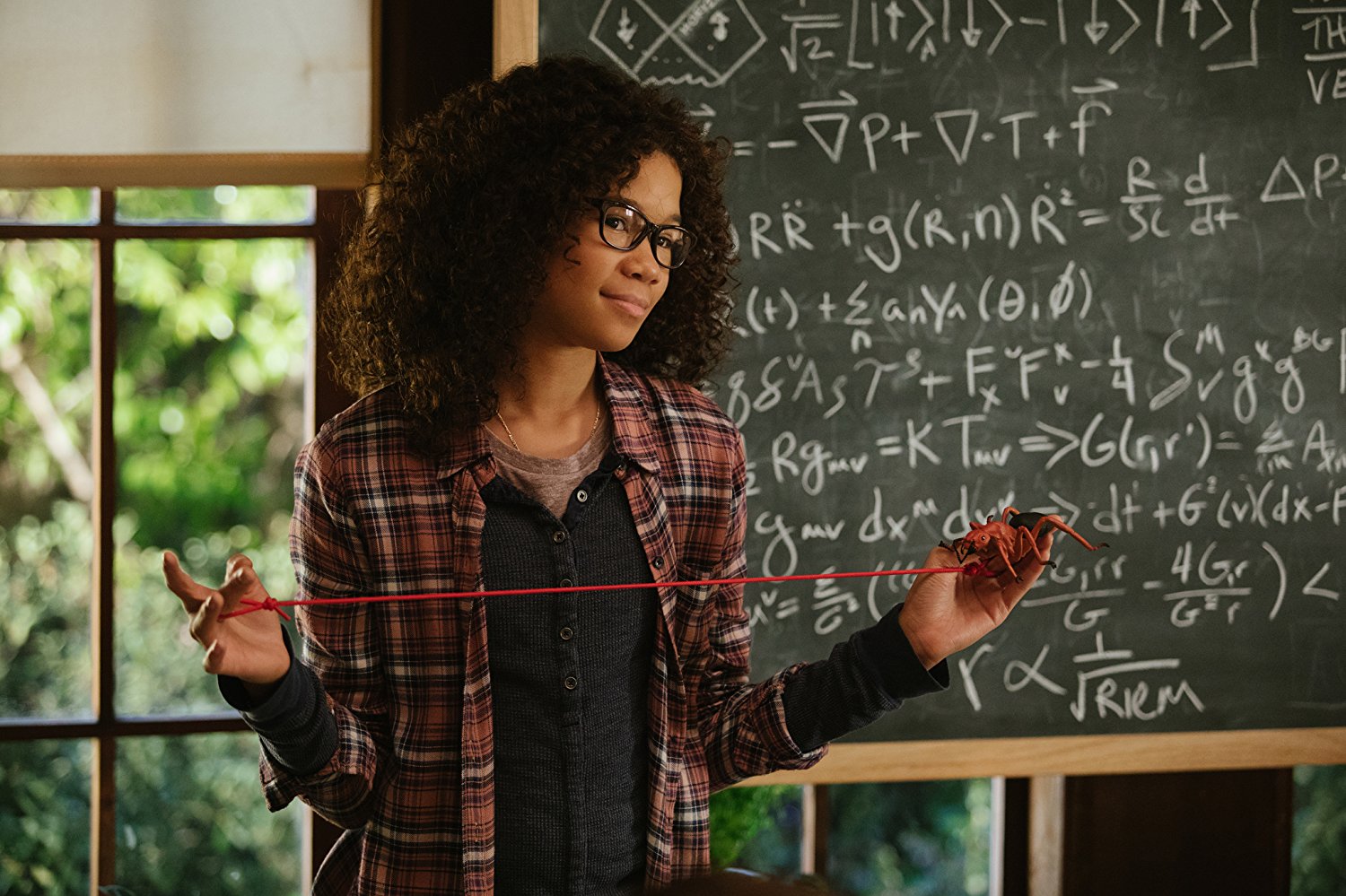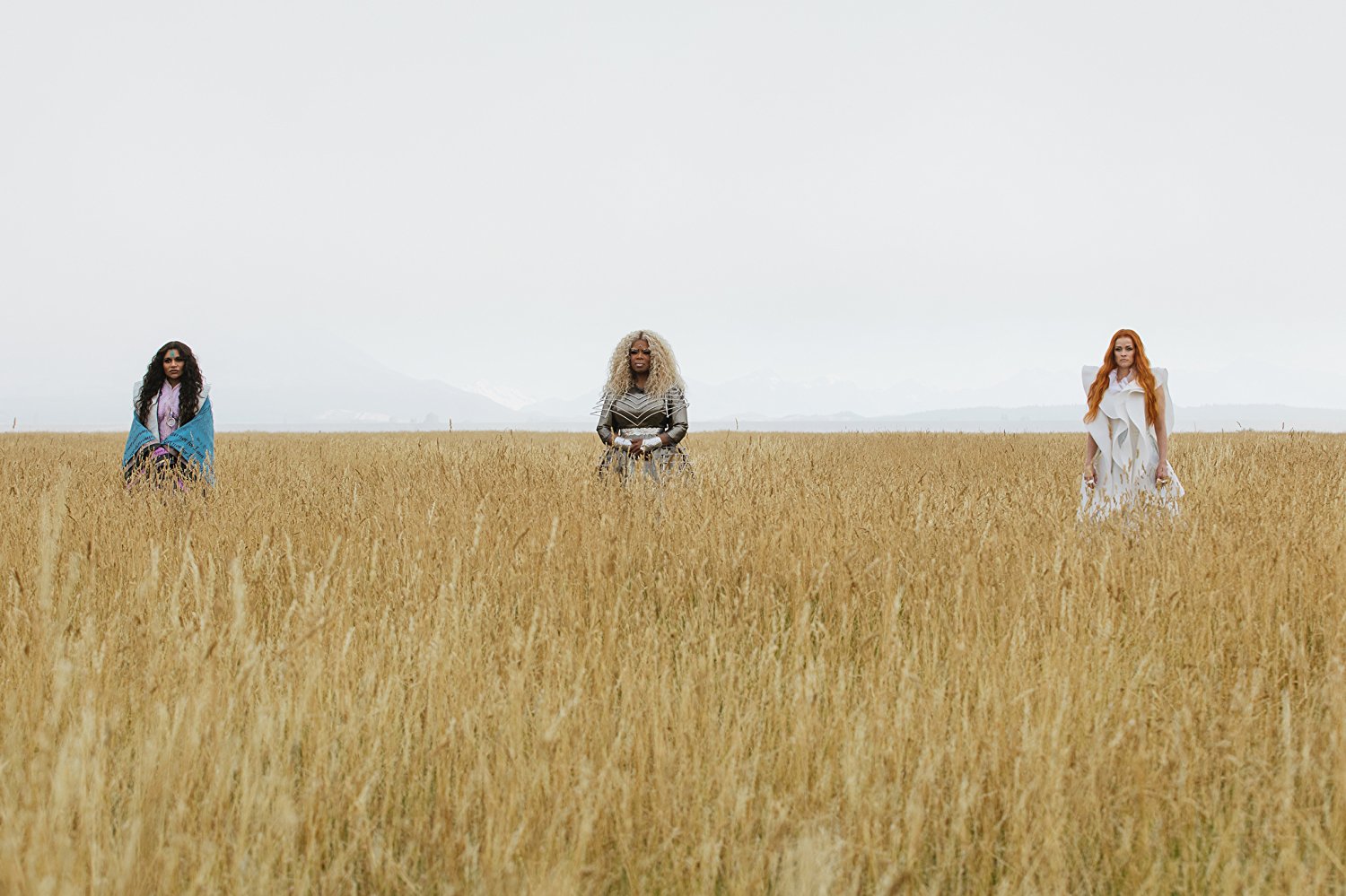by Chris Feil
 With an authentic sense of wonder for the human spirit in its blood stream, A Wrinkle in Time adapts Madeleine L’Engle’s beloved classic with the air of intense responsibility. Directed by Ava DuVernay, this interdimensional tale of adolescent self-affirmation casts its holistic intentions on a massive canvas that remains deeply personal. It’s a CGI space hug resolute in empowering the viewers that find themselves diminished by their environment and maybe even Wrinkle’s cinematic contemporaries.
With an authentic sense of wonder for the human spirit in its blood stream, A Wrinkle in Time adapts Madeleine L’Engle’s beloved classic with the air of intense responsibility. Directed by Ava DuVernay, this interdimensional tale of adolescent self-affirmation casts its holistic intentions on a massive canvas that remains deeply personal. It’s a CGI space hug resolute in empowering the viewers that find themselves diminished by their environment and maybe even Wrinkle’s cinematic contemporaries.
Newcomer Storm Reid plays Meg, a solemn preteen mourning the disappearance of her astrophysicist father (played by Chris Pine) and coping with the cruelty of pretty-girl bullies. Her despair and the naivete of her younger brother Charles Wallace (an adorable and teensy Deric McCabe) summons three otherworldly mystic Mrs.: Reese Witherspoon as the shady and effervescent Mrs. Whatsit, Mindy Kaling as the quote-happy Mrs. Who, and Oprah Winfrey as the all-knowing Mrs. Which. With her brother and a newfound friend, Meg portals across the universe under the guidances of the Mrs. to rescue her father from the evil forces of the invading It that trap him.

The visual excess that Wrinkle delivers is excitingly one of the more underivative efforts in post-Lord of the Rings fantasy filmmaking. DuVernay’s visual influences skew closer to Hayao Miyazaki and 80s Jim Henson efforts, its weirdness refreshing in ways that children’s films seldom are allowed to be in this corporate age of dulled edge mass agreeability. The imagination unfurling before us is specific, inviting us to unfurl its oddness along with the heroes rather than be lobotomized by yet more pixels.
This visual uniqueness plays well with the spiritual journey at DuVernay’s forefront, as interested in the layers beneath the expected storyline as she has been in films like Middle of Nowhere and Selma. This film’s insight into the youthful mindset is one of its strengths, with an interesting visual distinction drawn between adult space and children space. While the earthly adults don’t become as completely drawn as Meg, you can see DuVernay spark to filling this world with more than just Meg’s story. And similarly, there is as much intrigue (and grace) in how The It overpowers Meg as it does her father.
As Meg and friends attempt to escape The It’s cunning pull, the film continually complicates its vision of a dark energy snuffing out our inner light. The hellscape of The It includes homogenization, tacky materialism, and staring into an abyss of yet to be seen manipulations from sketchy adults. That’s heavier lifting demanded of the audience than the average big budget spectacle, let alone one meant squarely for an audience usually talked down to with fart jokes and consumerism. There is intention behind its genre elements that is ever so slightly subversive to what we’ve been conditioned to expect.
Wrinkle has ambitions that the performatively hip will simply not abide. And while rest assured that the film has a handful more motivational psychology than it needs, its ideology of self-love radiates throughout the film's design and stylistic flourishes to make for a uniquely conceived experience. There is rigorous anti-cynicism at play here, the film predicting its own detractors and embraces them all the same.
A Wrinkle in Time isn’t “cool” and that’s okay. As with anything else, the film is better for not being for everybody.

Sure, its sincerity isn’t always on side. There is a bit of battling tones here that don’t always sync, the light whimsy of its design at odds with the heavily repeated themes of self-worth. The richly felt heights of both are what make the film so singular, but the balances remains off. It’s a quietly interested film that’s nevertheless occasionally rather loud.
Despite the thematic obviousness of this film, DuVernay continues to show that her strength is discovering the nuance within her subjects. There is an intimacy here that is bold, even daring for a film aiming primarily at young minds. But even this aspect is another way in which DuVernay reveals our biases about what a family film can be and makes us question those perceived limitations. The kids in the audience aren’t kept at arms length or treated as commodity, and her respect for the emotional intelligence of children sets Wrinkle apart.
Delicate it is not, but nonetheless mighty, this film attempts more in a genre package than most of its fantasy brethren. A Wrinkle in Time doesn’t need anyone to illustrate why sincerity is worth a damn. It does that all just fine by itself.
Grade: B